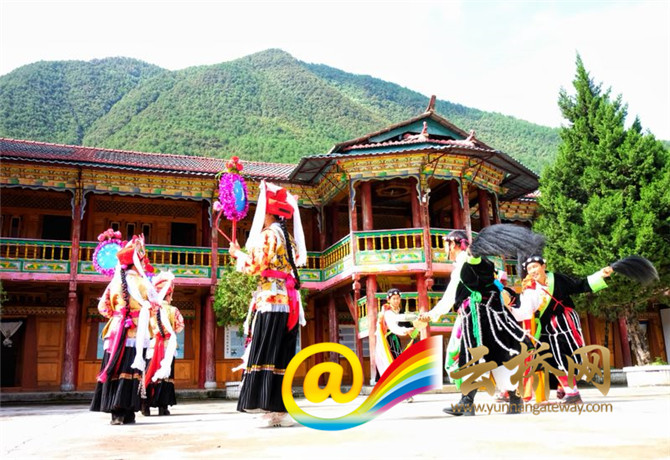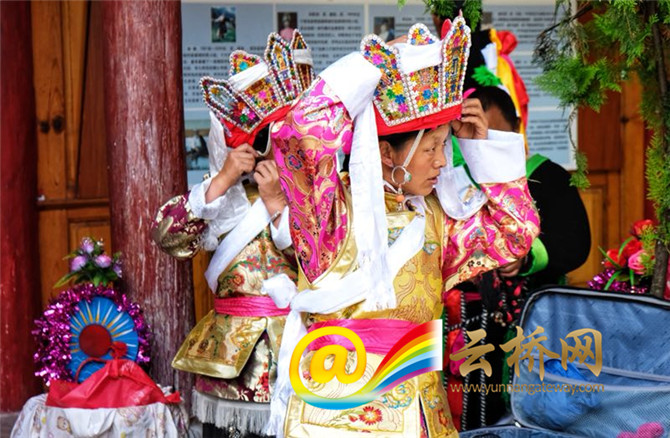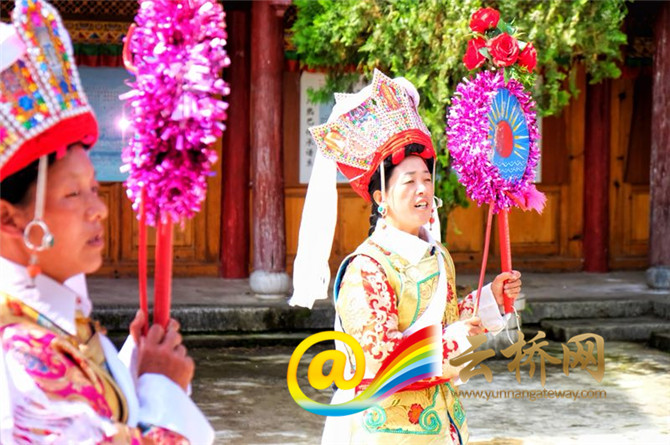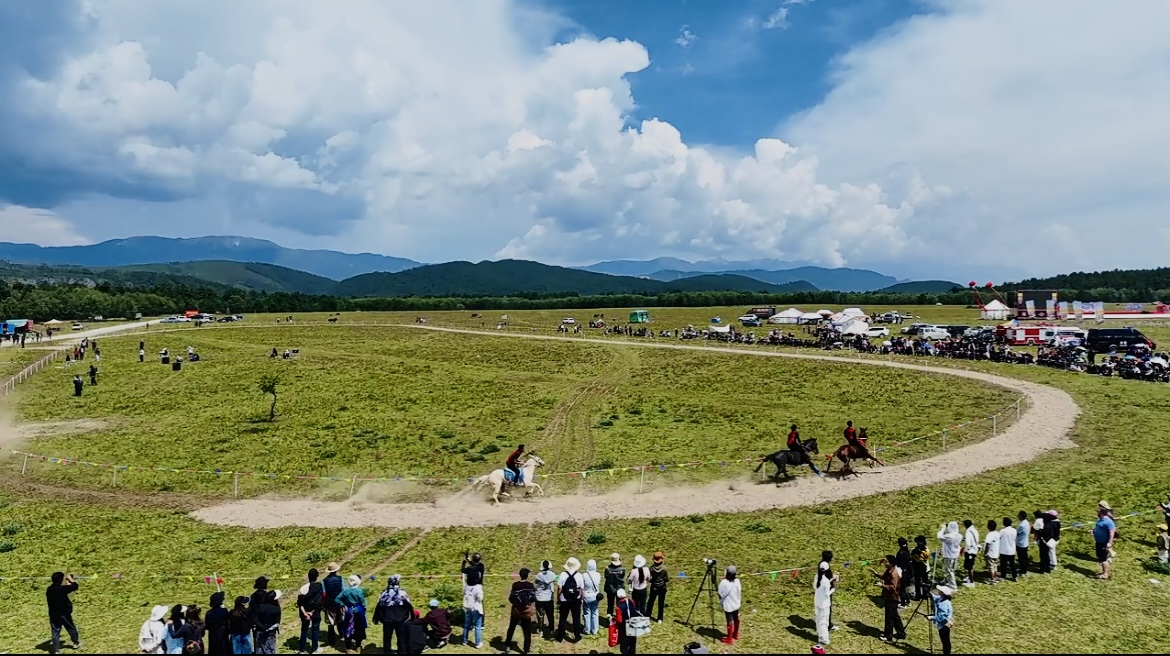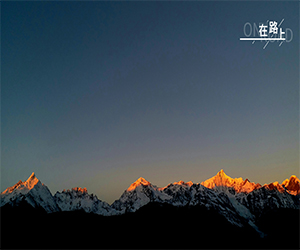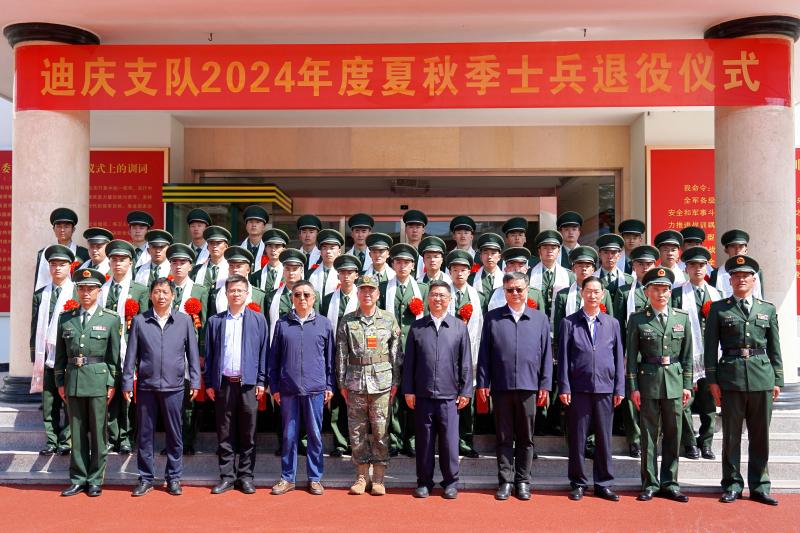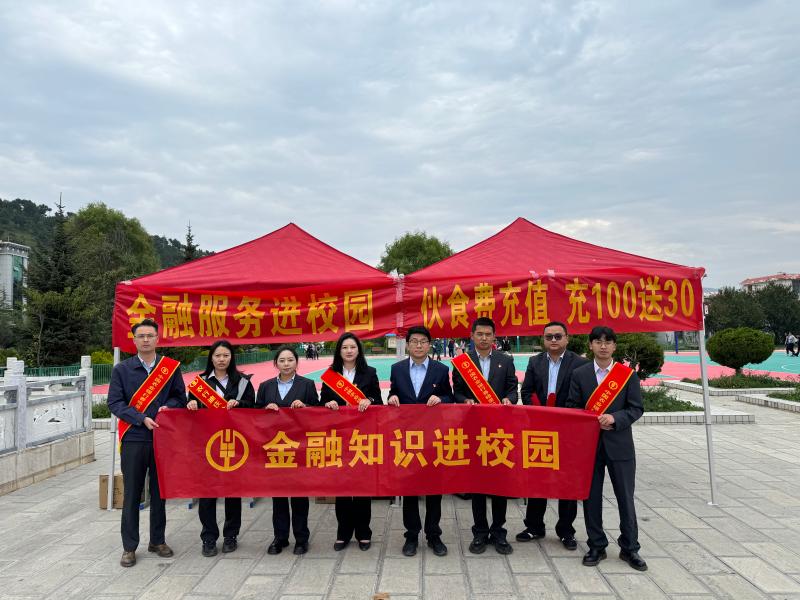|
“跳塔城热巴,是为了祈福。而如今,我们是在享福了!”8月30日早上11:00,在迪庆藏族自治州维西傈僳族自治县塔城镇热巴保护传习中心,38岁的州级非遗传承人李丽华刚刚领着乡亲们表演了一段塔城热巴,他带着一身汗水在石台阶上找了一处干净的地方坐下来歇口气。 “The Reba dancing in Tacheng used to be a pray for blessing. Now, we dance to show our happy life,” said Li Lihua, a Reba inheritor at the prefectural level. On August 30 morning, the 38-year-old Li Lihua was resting on the stone steps outside the Reba Protection and Training Center in Tacheng Town, northwest Yunnan’s Diqing Tibetan Autonomous Prefecture. She just led local folks in a Reba dancing.
“对我们非遗传承人来说,这是最好的时代。”李丽华的话得到了和金英的点头认可,48岁的和金英是县级传承人,不过,她的父亲处登是当地唱跳热巴最有名的老师,他俩都是处登的传人。如今,老人已过世。为了传承技艺,2015年他们搭档成立了塔城镇塔城村塔城古典热巴产业协会,带着家乡人——塔城村英都湾村民小组的乡亲们吃上了“热巴饭”。 “As a intangible heritage inheritor, I feel we are living in a best time.” Li Lihua’s words were echoed by He Jinying, a county-level inheritor aged 48. Jin Ying’s father was a local master in the Reba dancing, who passed down his dancing skills to both Li Lihua and his daughter. The master has passed away. To better inherit the skills, they joined hands with local villagers and set up in 2015 the Tacheng Classical Reba Industry Association.
此前1年,也就是2014年,“迪庆热巴”被国务院公布列入国家级非物质文化遗产代表性项目名录。它主要流传在德钦县云岭乡、维西县塔城镇、香格里拉市五境乡、香格里拉市上江乡、香格里拉市金江镇等5个乡镇。 In 2014, the State Council rated the Reba dancing as an intangible heritage at the national level. The art is highly popular in five towns and townships in Deqin, Weixi and Shangri-La. 作为塔城热巴的传承人,李丽华唱跳很有激情,而讲话却是不紧不慢的,他从“传说”开始给我们讲塔城热巴的故事:传说,到维西修行的达摩到村里传授热巴,可是,这种舞蹈不是每个地方都适合跳,一直到永贡村才找到合适的传人。因为是祈福的舞蹈,所以,适合的地方就会人畜兴旺、五谷丰登。永贡村在藏语里是:接福的地方,这就是后来的英都湾村民小组。 As the Reba inheritor of Tacheng Town, Li Lihua sang with passion but told us the Reba story in a moderate tone: Bodhidharma, who was practicing Buddhism in Weixi, came to teach the dance in the countryside. This dancing is very particular in choosing the dancer, and the sage did not find a proper candidate until he visited the Yonggong village. In the Tibetan language, Yonggong Village means a place to receive blessings. It was believed that any place chosen for Reba is bound to prosper.
“处登唱跳热巴,那是相当有名气。”李丽华回忆,童年最美好的夜晚是躺在床上、隔墙听处登唱热巴。那是父亲到处登家围着火塘学习请教,因为两家人是邻居,隔墙聆听非常清楚。当然,李丽华的师傅还是父亲,平日里父亲有空就教他唱跳。“塔城热巴有24段歌舞,全部学完一般需要3年以上的时间。”李丽华说,他与和金英不仅掌握了全部内容,还能当领唱、领舞。 “There used to be a famous Reba dancer and singer named Chudeng,” Li Lihua recalled. Chudeng was the next-door neighbor of Li Lihua, and his voice could be clearly heard at Li’s home. The father also learned Reba from Chudeng and taught Li Lihua at leisure. “The Tacheng Reba is divided in 24 singing and dancing pieces, and it usually takes a learner more than 3 years to complete all 24 pieces.” Li Lihua and He Jinying have mastered all 24, and they take the lead both in dancing and singing. “塔城热巴的服饰很有讲究,穿好整套女装大约要半个多小时。你看,我们表演队每个人有一个背篓或是一个旅行箱,满满地装着自己的服饰。”和金英娓娓道来,男装背上的七彩带,7个颜色的布带分别代表蓝天、白云、太阳、高山、海子(注:湖泊)、水稻、鲤鱼。女装标配的日月鼓,一面画着太阳、一面画着月亮,而唱词里面也会唱太阳、唱月亮。总之,服饰与唱词都反映出当地人对自然的热爱、崇拜、敬畏。 “The Reba in Tacheng is very particular in costumes and dressing up,” said He Jinying. “Before each performance, the women actors would spend half an hour dressing up, each taking a back-basket or suitcase full of costumes and accessaries.” On the man actors’ costumes, there are some seven-color strips, with the colors representing the blue sky, white clouds, the sun, the mountains, the lakes, the rice, and the carp. The women's dress features a drum pattern with the sun and the moon painted on its sides.
“以前,大家穷,一套女装要5、6家人才能凑齐。现在,日子越来越好过,一人有两套服饰,那是很平常的事情。”和金英笑着说,“我这套女装要2万元左右,也就是个中上水平,村里其他人家还有更好的呢。” “In the past, a set of the Reba costume for women needs contributions from five or six families,” He Jin Ying said, smiling. “Now, we are bettering off and it’s common for each actor to have two sets.” He Jinying added her costume set costs about 20,000 yuan, and some villagers have better and more expensive costumes. 英都湾村民小组有78户人家,家家户户、老老小小都会跳热巴。不过,热巴的内容决定了它是很隆重、很正式的唱跳,不能随便即兴歌舞。过去,农历二月初八,在春天来临之际、在播种之前,全村唱跳热巴。现在,英都湾村民小组在外工作、打工的人多了,为了照顾要外出的亲人,他们从2013年开始把唱跳的日子提前到农历二月初三,那是全村一个重要的日子,全天唱跳,热烈而欢快。 In the Yingduwan villagers’ group, all folks in the 78 households can dance Reba, but the annual group dance is still grand, formal and ceremonious. The group dance used to be held on the eighth day of the second lunar month annually. Starting in 2013, the group Reba falls on the third day, so that some villagers can leave home earlier to work as migrant workers.
“关于塔城热巴,我还在不断地学习研究。”李丽华谦虚地说,自从开展“非遗进校园”活动,他被请到维西的中小学、香格里拉的中小学授课,因此,要边教边学,才可能把传承工作做好。“我们的产业协会还把手工制作热巴服饰的生意做到了各个学校。”李丽华说,这就是乡亲们吃上的“热巴饭”。 “I still keep learning the Tacheng Reba for teaching,” Li Lihua said he teaches the dance in the primary and secondary schools in Weixi and Shangri-La. “And hand-made costumes at the Reba industry association are favored by local schools, bringing more income to the villagers. “旅游的发展,也给我们带来了好日子。”和金英补充道,今年6月,设在塔城镇启别村的哈布达农庄旅游有限公司试营业,至今送了3批客人到英都湾村民小组欣赏塔城热巴,给产业协会的会员们带来了近4000元收入。 “Tourism also enriches the Reba dancers.” He Jinying added a neighboring village set up a tourist company this June. Members of the Reba industry association danced for the tourists, earning nearly 4,000 yuan. “今年,俄罗斯有团体邀请我们去表演。只是因为路费太高,没有成行。”李丽华从中看到了新机遇,”我们要在这个最好的时代让塔城热巴越来越‘热’!” “Earlier this year the performing team got an invitation from Russia, but we did not go there due to high cast in travel.” Li Lihua has seen craze for the Reba dance. 云南日报全媒体记者:储东华 熊燕 张若谷 李文君 编译:王世学 |
【文化迪庆有传人】李丽华跳塔城热巴:祈福接福享福
来源:香格里拉网 作者: 发布时间:2018-09-17 16:33:51

频道精选
- 2024 年迪庆州新闻系列综合高级职称定向评审通过人员名单公示2024-09-05
- 香格里拉景区直通车:便捷出行,一站直达美景2024-09-05
- 香格里拉景区直通车:便捷出行,一站直达美景2024-09-05
- 张卫东到迪庆交通运输集团公司开展调研2024-09-05
- 福彩代销者:增强责任意识 倡导理性购彩2024-09-04
- 中央专项彩票公益金的用途及作用|下篇2024-09-04
- 中央专项彩票公益金的用途及作用|中篇2024-09-04
- 中央专项彩票公益金的用途及作用|上篇2024-09-04
- @迪庆人,这场活动需要您的参与!2024-09-04
- 积极参与2024年“99公益日·助力迪庆见义勇为”宣传募捐活动倡议书2024-09-04
